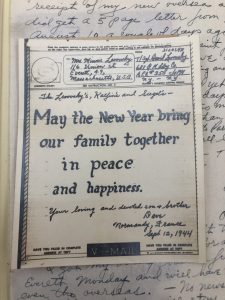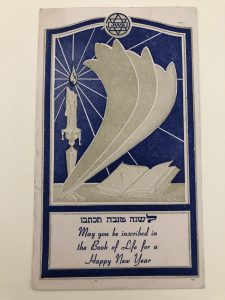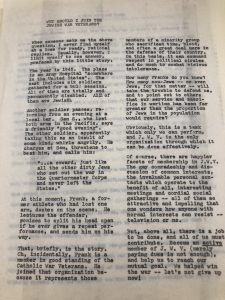By Susanna Sigler, Library Assistant
In my previous blog posts, I have explored MHS collections related to WWII. It likely isn’t a surprise by now that the Society holds a relatively small but strong number of these collections. But did you know that several of them are personal narratives of Jewish American soldiers? As we near the end of Jewish American Heritage Month, and having just observed Memorial Day, I want to highlight a handful of these Jewish voices in our collections.
One is the Robert E. Siegel papers, which I looked at for two blog posts this past year. Robert was a young soldier killed in France in 1944, and his mother compiled two scrapbooks in her quest to have him posthumously awarded the Bronze Star. As a Jewish American, I found it deeply moving to see this work of love and grief, especially the pages filled with notes of condolence from friends and family alike. In letters to his parents during training, Robert writes of attending events hosted by the Jewish Welfare Board, a non-profit which, alongside other organizations like the YMCA, attended to the spiritual and recreational needs of soldiers during the war.
Another collection is the Levovsky family papers, which contains letters by two brothers overseas to family back home. David (“Dave”) Levovsky served with the U.S. Army, 681st Quartermaster Laundry Company, and his brother Simon (“Sy”) with Army counterintelligence. David’s letters are not the narratives of combat that we largely see portrayed in popular films and books – his unit’s work is part of the massive infrastructure needed to move men and machines across a continent, and which we often forget about when thinking about the war. It’s fascinating to read about how David uses his “Jewish” (Yiddish), augmented by some German, to communicate with Polish and Yugoslavian POWs who are on labor detail. The Levovskys exchanges High Holiday greetings, andDavid is sent gifts of dried fruit (except from his sister Bertha, who sends a salami – his response is truly hilarious). He attends services when he can, and in one especially moving letter, recounts meeting a Jewish refugee in Normandy, “a nice little old lady with a blue dotted kerchief over her head” who visibly relaxes when in the company of David and fellow Jewish soldiers.

The last collection I want to share is the Samuel L. Barres papers, recently written about by Meg Szydlik in her series on disability in the archives. Samuel was Jewish, the only son of immigrant parents. When he wrote home to his widowed mother, he sugarcoated his experiences so as not to make her worry. He speaks fondly of her home cooking, writing that he really can’t think of anything else for her to send him unless she could send him some herring or gefilte fish (agree to disagree here, Samuel). Like David Levovsky, he refers to his Yiddish as Jewish, and helps his mother with her English through gentle lessons in his letters. I couldn’t help but draw parallels to my grandmother’s family – like Samuel, she and her brothers were born to Jewish immigrant parents. All three of my great uncles served in WWII (as did my grandfather), and at the time of the war were children of a widowed mother. He had passed away when my grandmother, the youngest, was seventeen, the same age as Sam.

Like each collection here, the Barres papers are a treasure trove, and I can’t do them justice in a blog post. However, Day, I wanted to highlight an appeal written by Samuel’s friend Bill Carmen, who was the national commander of the Jewish War Veterans of the United States of America, as well as instrumental in the construction of the New England Holocaust Memorial in Boston. Titled “Why Should I Join The Jewish War Veterans,” he speaks of solidarity between veterans organizations against antisemitic prejudice – people who call Jewish soldiers cowards who “sat out the war in the Quartermaster Corps and never left the States.” (This is the same unit with which David Levovsky served, as you’ll recall – he did not sit out the war, and even left the states.) “We helped win the war,” Carmen writes. “[l]et’s not give up now!”

Exploring these collections, I experience a range of emotions – sadness, fierce pride, feelings of familiarity and tenderness reading these soldiers seek out the comfort of their religion and upbringing far from home, what I know too having grown up as an Ashkenazi Jewish person in Massachusetts. All this in a war that always was and proved itself further to be deeply, horrifically personal.
Further reading on these collections can be done by visiting the MHS, and I really recommend that you do. I also want to share the Library of Congress page for the 2023 Jewish American History Month, as well as this blog series by Claire Jones on Judaica in the collections of the American Antiquarian Society.
Sources
Long, Tom. “William Carmen, ‘man of many passions.’” The Boston Globe. December 31, 2004. Accessed May 24th, 2023. http://archive.boston.com/news/globe/obituaries/articles/2004/12/31/william_carmen_man_of_many_passions/.
“National Jewish Welfare Board.” Wikipedia. Accessed May 24th, 2023. https://en.wikipedia.org/wiki/National_Jewish_Welfare_Board.

